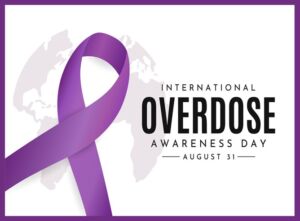
International Overdose Awareness Day (IOAD) is observed annually on August 31. It is recognized globally as the most extensive campaign to end overdoses, reduce stigma, and honor those lost to drug-related deaths. This day was founded in 2001 by Sally J. Finn, who was working at the Salvation Army Crisis Centre in St Kilda, Melbourne, Australia. At the time, she was managing a needle and syringe program and wanted to create a space for families and communities to mourn those lost to overdose without stigma or shame publicly. The first event was modest, a BBQ and social gathering, but it quickly grew into a national and then international movement.
Purpose and Goals:
- Raise Awareness: IOAD aims to educate the public about the risks of overdose and the importance of prevention.
- Reduce Stigma: It challenges the shame and silence surrounding substance use and overdose, encouraging open conversations and compassion.
- Honor Lives Lost: The day provides a space for families and communities to mourn loved ones without guilt or shame.
- Promote Prevention: It advocates for evidence-based policies, access to treatment, and overdose reversal tools, such as naloxone (Narcan).
This Year’s Theme:
This year’s theme, “One Big Family”, emphasizes unity and collective responsibility. It encourages communities to extend compassion beyond their immediate circles and treat everyone affected by substance use as part of a shared human family.
How to take Action:
- Get trained in naloxone use: This life-saving medication can reverse opioid overdoses.
- Attend or host events: Candlelight vigils, educational workshops, and remembrance walks are common.
- Wear purple: Purple ribbons and clothing symbolize awareness of overdose prevention.
- Share stories and resources: Social media campaigns help spread awareness and reduce stigma.
Signs of an Overdose and What to Do if You Witness One.
- Unconsciousness or inability to wake up
- Slow, shallow, or stopped breathing
- Gurgling or choking sounds
- Blue or pale lips, fingertips, or skin
- Pinpoint or dilated pupils
- Vomiting or nausea
- Disorientation or confusion
- Seizures or convulsions
- Chest pain or irregular heartbeat
- Extreme agitation, paranoia, or hallucinations
- Cold, clammy skin or abnormally high body temperature
- Unsteady walking or coordination issues
- Call 911 immediately
- Administer naloxone if opioids are suspected
- Check breathing and pulse
- Place the person in the recovery position (on their side)
- Stay with them until help arrives
- Do not give food or drink
- Bring any drug containers or paraphernalia to the ER
At Overcome, located in Lakewood, New Jersey, we offer Outpatient treatments for Drug Rehab so no one has to witness an overdose. We have treatments for those who have an addiction to Marijuana, Opioids, Ketamine, Meth, fentanyl, heroin, Cocaine, and Prescription drugs. Call us at 732-505-7261.

